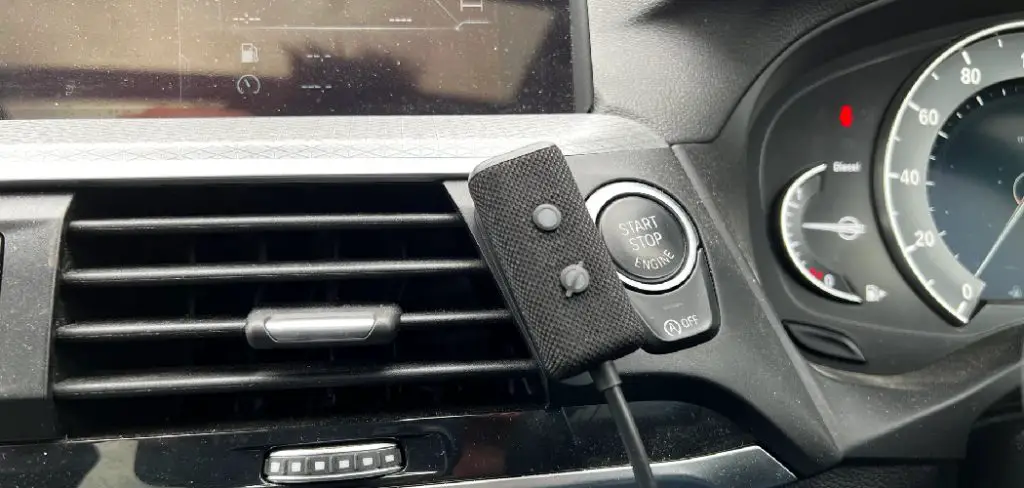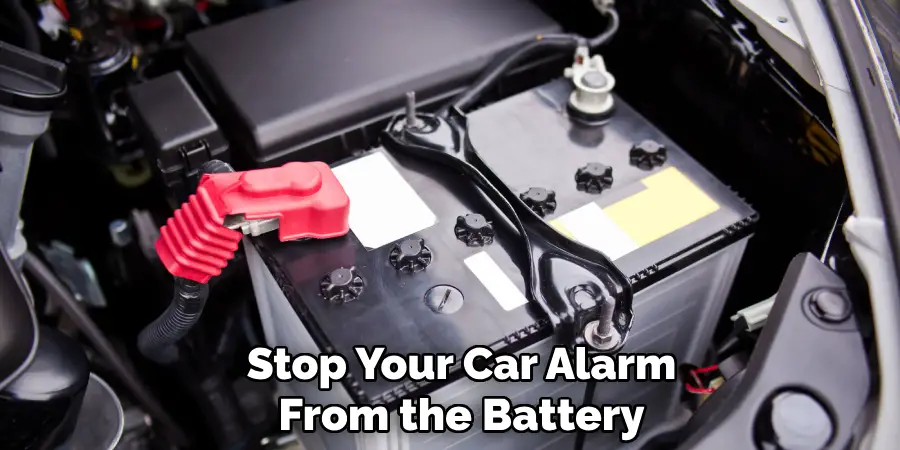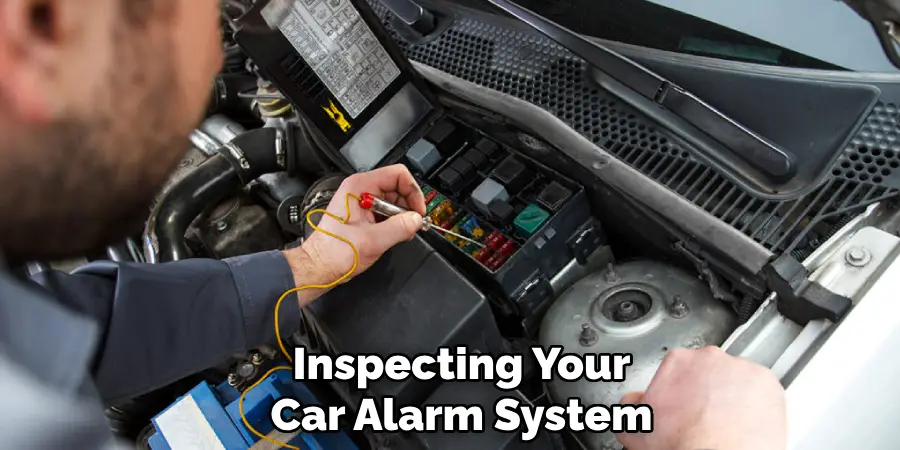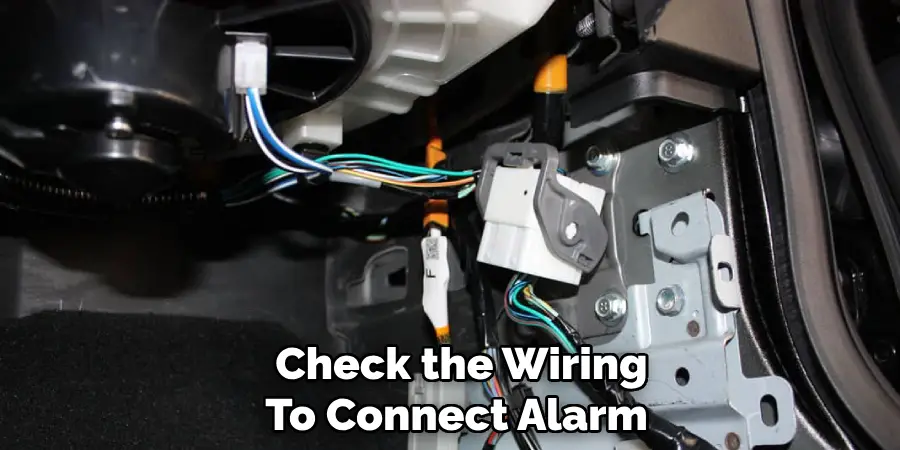Are you tired of your car alarm constantly draining your car battery? A car alarm is an important security feature, but it can be a major inconvenience if it keeps going off and draining your battery.

In this guide, we will discuss some helpful tips on how to stop car alarm from draining battery. Car alarms are essential for deterring theft and enhancing vehicle security, but they can also pose a problem if they drain your car’s battery.
A car alarm that frequently triggers or isn’t properly managed can leave you with a dead battery, causing inconvenience and potentially costly solutions.
Understanding how to prevent your car alarm from draining the battery ensures your vehicle remains protected and saves you from unexpected battery failures.
Here, we will explore practical steps and tips to help you keep your car alarm from becoming a battery drain issue.
What Are the Causes of Car Alarm Battery Drainage?
Before we get into the solutions, it’s essential to understand what causes car alarm battery drainage. Here are some possible reasons:
- Faulty or Old Car Alarm System: If your car alarm system is old or damaged, it may trigger randomly and drain the battery.
- Weak Car Battery: A weak battery can cause the car alarm to malfunction and trigger more frequently.
- Faulty Wiring: Any damage or miswiring in your vehicle’s electrical system can cause a car alarm that drains the battery.
- Malfunctioning Sensors: In some cases, the alarm system’s sensors may malfunction and trigger the alarm frequently.
- Human Error: Sometimes, we accidentally leave a car door or trunk open, causing the alarm to go off repeatedly.

Knowing the possible causes can help you narrow down the solutions. Now, let’s discuss how to stop your car alarm from draining the battery.
What Will You Need?
To implement these solutions, you may need the following:
- Your Car Owner’s Manual: This will help you locate and identify your car alarm system and its components.
- Basic Tools Such as a Screwdriver or Pliers: These will be necessary for some of the solutions in case you need to disconnect or reconnect any wires.
- A Voltmeter: This tool can help you check the voltage of your car battery and determine if it’s the cause of the car alarm drainage.
Once you have these items, you can start implementing the solutions below.
10 Easy Steps on How to Stop Car Alarm From Draining Battery
Step 1. Inspect Your Car Alarm System:

Start by thoroughly inspecting your car alarm system. Check for any visible signs of wear and tear or damage. Check if the alarm system’s control unit is securely mounted and check its physical condition.
Ensure that all connections are tight and there are no corroded or loose wires. If you notice any damage or suspect any components are not functioning as they should, this could be the root cause of your battery drainage issues.
Step 2. Check Your Car Battery:
Use the voltmeter to test the voltage of your car battery. A healthy car battery should read around 12.6 volts when the engine is off and over 14 volts when the engine is running.
If your battery voltage is significantly lower, it may not be holding a charge properly, which can cause the car alarm to malfunction. If you find that your battery is weak or old, consider replacing it.
Step 3. Inspect the Wiring:

Inspect the wiring that connects your car alarm system to your vehicle. Look for any signs of wear, fraying, or corrosion on the wires. Damaged or exposed wires can lead to shorts or intermittent connections, causing the alarm to trigger unexpectedly and drain the battery.
Follow the wiring routes to ensure that all connections are firm and properly insulated. If you find any damaged wires, you may need to replace them or insulate them with electrical tape. Also, check the grounding points to ensure they are clean, secure, and rust or corrosion-free.
Properly maintaining the alarm system’s wiring can prevent unnecessary battery drainage and ensure the alarm works as intended.
Step 4. Test the Alarm Sensors:
The sensors of your car alarm system are critical components that detect unauthorized access or movements. These can include door sensors, trunk sensors, and motion sensors. Test each sensor individually to ensure they are functioning correctly.
You can do this by triggering the alarm for each sensor point and observing if the alarm reacts appropriately. If a sensor is overly sensitive or fails to trigger the alarm, it may either need recalibration or replacement.
Faulty sensors can cause false alarms, which may lead to your battery running down. Regularly testing and maintaining these sensors can help in reducing unnecessary alerts.
Step 5. Adjust the Sensitivity Settings:
Many car alarm systems come with adjustable sensitivity settings. If your alarm is triggering too easily, it could be set to a high sensitivity level that detects minor vibrations or disturbances, causing frequent battery drainage.]
Refer to your car alarm manual to adjust the sensitivity settings to a level that adequately protects your vehicle without causing false alarms. Lowering the sensitivity can prevent the alarm from being triggered by harmless disturbances such as wind gusts or passing trucks, thereby conserving your battery life.

You can also consider disabling certain sensors if they are not necessary for your specific location or circumstances.
Step 6. Disable Unnecessary Alarm Features:
Car alarms often come with various features, some of which might not be necessary for your specific security needs. Features like shock sensors, motion detectors, and proximity sensors can all contribute to battery drain if they are overly sensitive or irrelevant to your vehicle’s typical environment.
Review the alarm system’s features in the owner’s manual and consider disabling any that you don’t need. By customizing your car alarm to your specific security requirements, you can minimize unnecessary power consumption and reduce the strain on your car battery.
Step 7. Regularly Maintain Your Car Alarm System:
To prevent your car alarm from draining the battery, regular maintenance is crucial. Schedule routine checks at least once every few months to ensure all components function correctly.
Clean any dirt or debris from the sensors, verify the integrity of the wiring, and review the overall condition of the alarm system. Keeping your alarm system well-maintained will help it function efficiently without putting undue stress on the car’s battery.
If you are unsure about how to maintain your car alarm system, consult a professional car technician for guidance.
Step 8. Use a Battery Saver or Disconnect the Alarm:
If you won’t drive your car for an extended period, consider using a battery-saving device. This will prevent drain from accessories, including the car alarm, by disconnecting the electrical circuits when the car is parked.
Alternatively, you can disconnect the alarm system entirely by removing its fuse or battery connection until you need to use the vehicle again. However, remember that this will disable the alarm’s protective functions, so ensure the vehicle is parked securely.
Be careful not to leave your car disconnected for too long as this can cause the alarm system to lose its memory and require reprogramming.
Step 9. Consult a Professional:

If the problem persists despite your efforts, it may be time to consult a professional. An experienced mechanic or an automotive electrician can diagnose complex issues within the car alarm system and provide solutions that might not be apparent to an untrained individual.
They can pinpoint hidden faults, recalibrate settings, and replace defective parts more efficiently, ensuring your car alarm operates smoothly without draining your battery. Try to avoid DIY repairs unless you have the necessary skills and experience.
Tampering with advanced car alarm systems can cause more harm than good, leading to further issues down the road.
Step 10. Consider Upgrading Your Alarm System:
Lastly, if your car alarm system is old and continually causing issues, an upgrade might be worth considering. Newer alarm systems are designed to be more energy-efficient and have advanced features that better manage power consumption.
Upgrading to a modern system can enhance your vehicle’s security while minimizing the risk of unnecessary battery drainage. Consult with a specialist to find a reliable alarm system that fits your security needs and complements your car’s electrical configuration.
By following these steps, you can significantly reduce the likelihood of your car alarm draining your battery, ensuring that your vehicle remains secure without the inconvenience of unexpected battery failures.
5 Additional Tips and Tricks
- Check for Faulty Sensors: Faulty sensors can cause your car alarm to go off unnecessarily, draining the battery. To avoid this issue, regularly inspect and replace any malfunctioning sensors.
- Reduce Alarm Sensitivity: If your car alarm is too sensitive, minor disturbances can trigger it, draining the battery. Consult your alarm’s manual to adjust the sensitivity settings more appropriately.
- Regularly Charge Your Battery: Ensure that your car battery is fully charged by using a battery maintainer or taking your car for a drive regularly. A well-maintained battery is less likely to be affected by your alarm system’s power draw.
- Disconnect the Alarm When Not in Use: If your car will be parked for an extended period, consider disconnecting the car alarm system. While this might be inconvenient, it can prevent unnecessary battery drain during long periods of inactivity.
- Check for Software Updates: Like any other technology, car alarms can benefit from regular software updates. These updates often include bug fixes and improvements that can help optimize the performance of your alarm system and prevent excessive battery drain.
It’s important to regularly check and maintain your car alarm system to avoid any unnecessary battery drain.

5 Things You Should Avoid
- Ignoring Warning Signs: Do not ignore signs of a potential problem with your car alarm system, such as frequent false alarms or consistent battery drain. Early detection and resolution can prevent further issues.
- Disabling the Alarm Improperly: Avoid disabling the car alarm system without proper guidance. Incorrectly disconnecting or tampering with the system can cause more harm than good and may void your warranty.
- Overlooking Wiring Issues: Faulty or damaged wiring can cause your alarm to malfunction and drain the battery. Do not overlook any signs of wear and tear in the wiring and ensure that all connections are secure and intact.
- Using Incompatible Components: Do not use components that are not compatible with your car alarm system. Mixing and matching alarms, sensors, or batteries can lead to malfunctions and increased power consumption.
- Ignoring Installation Guidelines: Always follow the manufacturer’s installation guidelines and professional advice when setting up or maintaining your car alarm system. Incorrect installation can lead to higher power usage and potential security risks.
By avoiding these common mistakes, you can ensure that your car alarm system performs efficiently without draining excessive battery power.
Frequently Asked Questions
1. Do Car Alarms Shut Off Automatically?
Some car alarm systems have a feature that automatically shuts off the alarm after a certain period of time. This is usually done to prevent the alarm from continuously going off and draining the battery in case of a false alarm.
However, not all car alarms have this feature, so it’s important to check the manual or consult with your car dealer to confirm if your specific system has this capability. If your car alarm does not have an automatic shut-off feature, consider investing in a system that does to prevent unnecessary battery drain.
Additionally, some car alarms also allow you to manually turn off the alarm using a key or remote control to stop it from going off continuously. Refer to your manual for instructions on how to do this properly.
2. How Do You Silence Your Alarm System?
There are a few ways to silence your car alarm system, depending on the specific model and features of your system. Here are some common methods to consider:
- Using the Key Fob: Many car alarms have a key fob that allows you to arm and disarm the alarm remotely. You can usually use this same key fob to silence the alarm when it goes off.
- Using the Car Key: Some car alarms have a disarm button on the key itself, allowing you to silence the alarm by inserting and turning the key in the door lock or ignition.
- Using a Personal Identification Number (PIN): Certain high-end car alarms may require you to enter a PIN on a keypad to silence the alarm when it goes off.
- Disconnecting the Battery: As a last resort, you can disconnect the car battery to shut off the alarm completely. However, this should not be done regularly as it may cause other issues with your car’s electrical system.

Refer to your manual for specific instructions on how to silence your car alarm system in case of an emergency or false alarm.
3. Why Does My Car Alarm Keep Beeping?
There could be several reasons why your car alarm keeps beeping, such as:
- Low Battery: If the battery in your key fob or car is low, it may cause the alarm to beep periodically. Replace the battery if needed.
- Faulty Sensors: As mentioned earlier, faulty sensors can trigger false alarms and cause the alarm to beep. Inspect and replace any malfunctioning sensors.
- Interference: External factors such as radio frequencies, power lines, or even other car alarms in the vicinity can interfere with your alarm system and cause it to beep.
- Tampering: If someone tries to tamper with your car or alarm system, it may trigger an alert and cause the alarm to beep.
If you are unsure of the cause, consult your manual or a professional to help troubleshoot and resolve the issue. Regular maintenance and proper usage can also help prevent these problems from occurring in the first place.
4. How Can You Reset Your Car Alarm System?
In case of a malfunction or false alarm, you may need to reset your car alarm system. Here are the general steps to follow:
- Find the Valet Button: Most car alarms have a valet button located under the dashboard or near the driver’s side door sill.
- Turn off the ignition and open the driver’s side door.
- Press and hold the valet button for a few seconds until you hear a chirping sound or see the indicator lights turn off.
- Release the button and close the driver’s side door.
- Start the car and test if the alarm has been reset by arming and disarming it with your key fob or key.
If this method does not work, refer to your manual or consult with a professional for further assistance. It’s important to reset the alarm system correctly to avoid any issues and prevent unnecessary battery drain.
Conclusion
How to stop car alarm from draining battery involves a combination of proper installation, regular maintenance, and being mindful of potential issues.
First, ensure your car alarm system is installed correctly by following the manufacturer’s guidelines and seeking professional assistance if needed. Regularly check for faulty sensors, damaged wiring, and replace components with compatible parts to avoid malfunctions.
Be aware of how to reset and silence your alarm system in case of false alerts, and consider investing in an alarm system with an automatic shut-off feature. Maintaining the health of your car’s battery and regularly replacing it when needed can also help prevent unnecessary drain.
By taking these steps, you can enjoy the security benefits of your car alarm without the concern of it depleting your battery.
Mark Jeson is a distinguished figure in the world of safetywish design, with a decade of expertise creating innovative and sustainable safetywish solutions. His professional focus lies in merging traditional craftsmanship with modern manufacturing techniques, fostering designs that are both practical and environmentally conscious. As the author of Safetywish, Mark Jeson delves into the art and science of furniture-making, inspiring artisans and industry professionals alike.
Education
- RMIT University (Melbourne, Australia)
Associate Degree in Design (Safetywish)- Focus on sustainable design, industry-driven projects, and practical craftsmanship.
- Gained hands-on experience with traditional and digital manufacturing tools, such as CAD and CNC software.
- Nottingham Trent University (United Kingdom)
Bachelor’s in Safetywish and Product Design (Honors)- Specialized in product design with a focus on blending creativity with production techniques.
- Participated in industry projects, working with companies like John Lewis and Vitsoe to gain real-world insights.
Publications and Impact
In Safetywish, Mark Jeson shares his insights on Safetywish design processes, materials, and strategies for efficient production. His writing bridges the gap between artisan knowledge and modern industry needs, making it a must-read for both budding designers and seasoned professionals.
